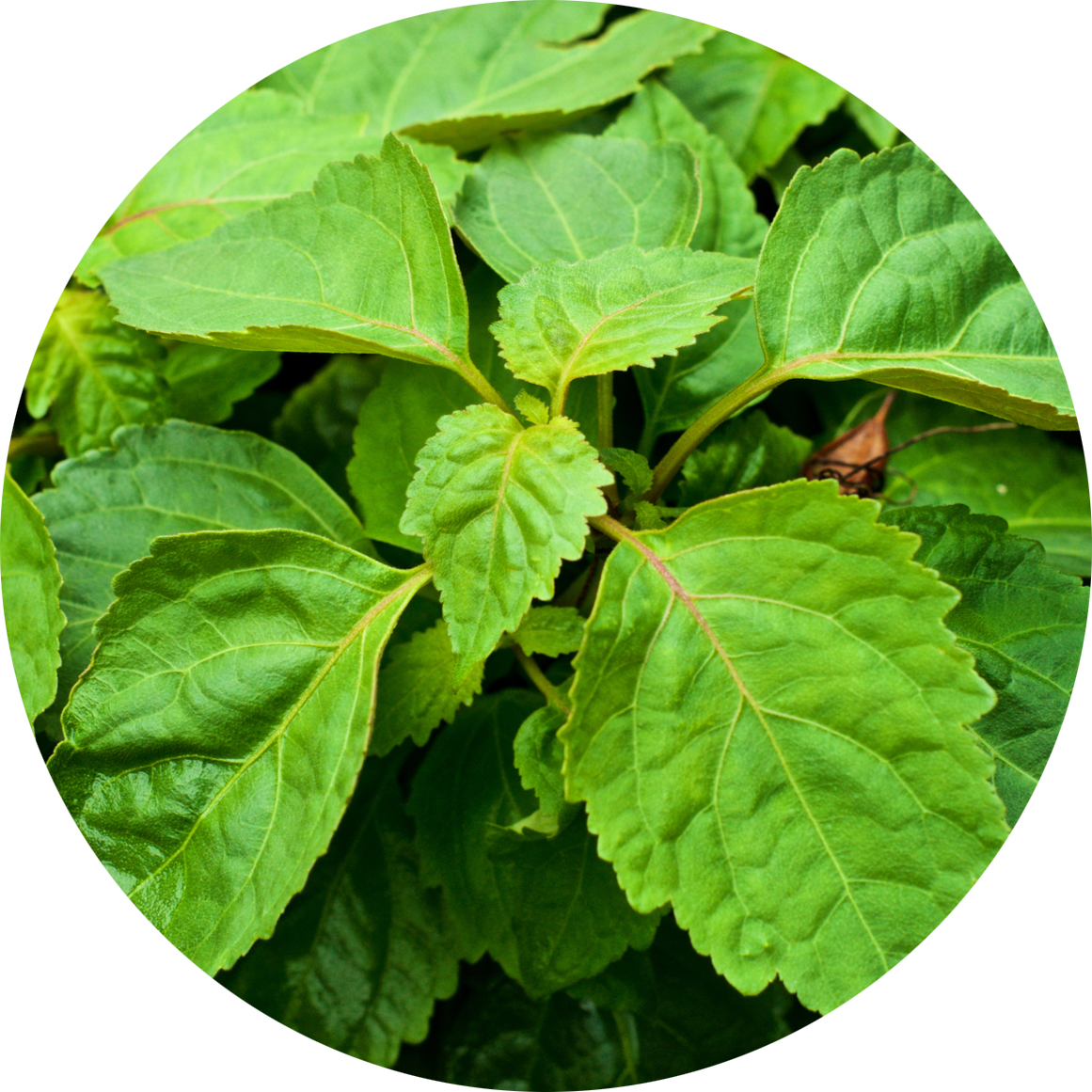(Pogostemon cablin)
The time has come for us to travel to Sri Lanka to pay a visit to a special plant: patchouli. In Tamil, the language of one of the peoples that inhabit this magical island, pacculi ellai means “green leaf”. In addition to the magical island of Serendip, which is the old Arabic name for Sri Lanka, patchouli grows in the wild throughout Southeast Asia, mostly in India, Indonesia, Malaysia, New Guinea and the Philippines, at altitudes over 1,000 metres above sea level, and is cultivated in other similar tropical areas, especially in Madagascar and the Caribbean. This shrubby plant’s appearance is not particularly captivating, its leaf is somewhat reminiscent of mint and lemon balm, which is not surprising given that it belongs to the same Lamiaceae family, which also includes lavender, rosemary, basil, oregano, sage, thyme… These related plants share a characteristic strong scent. That is why patchouli is especially appreciated today in the perfume industry, where it is used thanks to the components of its essential oil – patchouli and norpatchoulenol.
While we, humans, like patchouli – the same as lavender and rosemary, insects hate it, and therefore it has long been used as an insect repellent. Termites especially run away from it, which is why it is often planted around houses in the tropics. If its scent reminds us of Flower Children, that is not by accident. It is because its oil, which has a woody-musky scent, reached a peak of popularity in the West during the 1960s and 1970s among members of the hippie movement. That is why even today, when we burn a fragrant Indian stick which is imbued with the scent of patchouli, we feel as if we can hear “Let the Sunshine in” somewhere in the background, a song from the famous musical Hair.
Patchouli has a much longer history than the hippie movement. Pharaoh Tutankhamun was buried with almost 50 litres of patchouli oil; when traders from Europe discovered this fragrant plant, they used to pay for its weight in gold. Pogostemon cablin, as its scientific name suggests, is really worth its weight in gold because it has healing properties that can improve our physical and mental health. One of the reasons why hippies loved it is that its scent relaxes and relieves stress and anxiety.
PATCHOULI AND HEALING
This plant has been used in traditional Chinese medicine since the Han Dynasty, 200 BC, for colds, fevers, nausea, headaches and diarrhoea. Modern science has discovered that the healing properties of patchouli are based on its many useful components; terpenoids, phytosterols, flavonoids, organic acids, lignins, glycosides, pyrone, aldehydes, of which patchouli alcohol, beta-patchoulene, patchoulene epoxide, pogostone and pachypodol are particularly important.
There is a long list of patchouli’s effects: antimicrobial, antioxidant, anti-inflammatory, analgesic, antitumor, antidiabetic, antihypertensive, immunoregulatory, antiulcer… Scientists were particularly impressed by pogostone’s action, a secondary metabolite of this plant, which in a series of clinical studies has shown exceptional medicinal properties: pogostone prevents the accumulation of fat cells, so it is an excellent prevention against not only obesity but also type 2 diabetes. It affects opioid receptors, which makes it an excellent analgesic. It has the power to relax the walls of blood vessels, which is why it prevents atherosclerosis. It protects the mucous membrane of the digestive organs, thus preventing the formation of ulcers on the stomach and duodenum and reduces the symptoms of irritable bowel syndrome; with its strong antimicrobial action it prevents infections and effectively eliminates cancer cells. Pogostone protects the lungs from oxidative stress and has the same effect on the skin, thanks to which it neutralises the consequences of harmful UV radiation and prevents photoageing. Science is just beginning to discover all the beneficial properties of patchouli ingredients, and new discoveries are likely to impress us more and more. But when it comes to medicinal plants, what is certain is that our ancestors knew it all intuitively, even though they were not able to explain the mechanisms of action.
ANTIMICROBIAL ACTION
Just as it has the power to disperse termites, patchouli also affects microbes. The strong antibacterial action of this plant against Helicobacter pylori strains has been confirmed in laboratories, which explains its gastroprotective effect; it has the same action against Acenitobacter baumanii, Aeromonas veronii, Candida albicans, Enterococcus faecalis, Escherichia coli, Klebsiella pneumonia, Pseudomonas aeruginosa, Salmonella enteric, Staphyllococcus aureus, Vibrio harveyi and Moraxella catarrhalis. Its action against the last two strains makes it an excellent remedy for middle ear infections. Recent research has proven that pogoston can prevent hearing loss caused by infections involving these microbes. Patchouli also has a strong effect against the candida fungus, and is especially useful for vulvovaginal candidiasis. It also has a strong antiviral effect and is effective against influenza viruses.
By neutralising harmful bacteria that cause inflammatory processes, the components of this medicinal plant have an anti-inflammatory effect: they prevent and alleviate redness, swelling, inflammation and pain both in internal organs and externally, on the skin.
PATCHOULI AND THE SKIN
A 12 per cent patchouli essential oil concentration effectively eliminates skin infections and helps with wounds, abrasions, ulcers and bed sores. It is also very effective against insect bites. With its anti-inflammatory effect, this plant soothes the skin, promotes healing and reduces the feeling of pain.
Patchouli’s antibacterial effect against another microbe that causes a very unpleasant skin disorder – Propionibacterium acnes – is also evident. By combating bacteria and inflammation, patchouli does not only eliminate acne, but it automatically soothes the skin, helps reduce swelling, redness and pain, and promotes healing and pore closure. When all these properties are combined with its ability to prevent photo ageing and to strengthen the skin’s immunity, it is clear why patchouli is a valuable ingredient in face and body care cosmetics. That is why it is used in Devi cosmetics. In addition to a number of other valuable ingredients in Clear Skin Gel, patchouli also contributes to the regulation of sebum, to the reduction of pores, prevention of the appearance of acne or their treatment and also to the overall strengthening of the skin’s immunity.
In addition to a perfect complexion and clean skin, patchouli also gives us a calm mind, good concentration and optimism, which are just some of the reasons to let it into our lives and enjoy its benefits.

